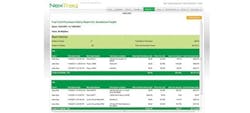About the author: Asset management for the street- & sewer-cleaning industry
Business managers in the street and sewer cleaning business must be concerned with asset management and monitoring vehicles to ensure productivity, efficiency and safety. In this industry, vehicles and equipment are key to business operations and are important company assets. Fleet managers must be able to track and manage these investments without compromising productivity or security. Street cleaning fleet managers can handle these challenges by implementing a GPS fleet-tracking solution.
According to the Aberdeen Group, 45% of service and manufacturing organizations reported that the development of visibility into service technicians, vehicles, parts and resources was a key part in ensuring improved field service performance. Simple communication between the main office and individual technicians and vehicles is necessary to run an efficient and profitable business. By equipping a fleet with a GPS tracking solution, the task of monitoring company assets is simplified.
In addition, there is a tangible and direct impact on operational functionality. Companies that implement a GPS fleet-tracking solution can see an increase in recovered stolen assets, a decrease in fuel costs and an overall increase in fleet productivity.
Fleet & Asset Tracking
The street and sewer cleaning industry requires fleets to be on the move but also accessible while mobile. At the basic level, a GPS fleet-tracking solution can let a fleet manager know where the company’s vehicles and employees are located and where they are headed, offering detailed information such as vehicle starts and stops—including the duration of the stops, which can be utilized to identify inefficiencies.
A company’s vehicles and equipment are important assets and major investments. If a piece of equipment goes missing, the cost of replacing it is a major concern, along with the lost revenue due to decreased productivity. A GPS fleet management solution provides the ability to track and recover any lost assets or equipment quickly by using the information provided by the tracking mechanism. This feature allows operations to return to normal as soon as possible.
When selecting a GPS fleet-tracking provider, consider an option that offers both GPS- and cellular-based devices, as well as satellite-only options to ensure that the tracking will work no matter how remote the location. Tracking devices should be energy efficient and resilient enough to be installed on the outside of the asset and able to weather any condition.
Fleet Optimization
According to AAA’s 2013 “Your Driving Costs” study, fuel costs have increased 1.93%, on top of the 14.8% increase from the previous year. The rising costs of operating a vehicle affect a company’s bottom line, leaving fleet managers searching for solutions that can improve their business operations.
Although fuel prices are unpredictable, a fleet’s fuel consumption and spending can be predicted and managed. Comprehensive GPS fleet-
tracking solutions offer fuel card integration and comprehensive fuel management solutions, allowing fleet managers to track, monitor and analyze fuel consumption and making it easier for fleets to improve efficiencies, reduce waste, account for fuel purchases and improve buying behavior.
Benefits of Simple Reporting
A clear view into a fleet’s operations makes it easy to identify inefficiencies while also showcasing which operational procedures work. The reports offered in a GPS fleet-tracking solution’s fuel management software should allow fleet managers to identify both human and vehicle errors, including fuel slippage or inefficient vehicle consumption.
An idle report allows for the reduction of harmful emissions and fuel expenses. The reporting capability provides a wealth of information and valuable insight at a moment’s notice. Perhaps most importantly, the collected data are actionable, meaning that the information can be put to use to improve processes.
Preventive Maintenance
A comprehensive GPS fleet-tracking solution also should provide the option to implement maintenance schedules and include reports on the status of a vehicle. These features extend the life of a company vehicle, and also can save money on costly repairs in the long run. Proactive and proper management of vehicles and maintenance schedules can keep a company’s assets running and vehicles at their most fuel efficient.
Download: Here


